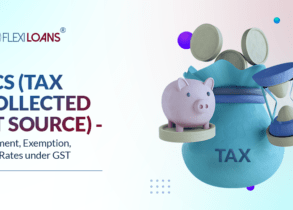Jun 22, 2022
Jan 14, 2026

Introduction
Your credit score is the most important aspect in determining whether the lender will trust you when you request any kind of loan, including an MSME loan, business loan, collateral free loan, or an unsecured loan. CIBIL, a TransUnion subsidiary, is an RBI-approved credit score organisation in charge of creating credit ratings for businesses and individuals based on information and data given by banking and financial institutions.
CIBIL rating enables a person to apply for financing options like mortgages and credit cards. A high CIBIL rating makes credit more accessible, and a low rating makes it tougher to get credit.
But what is a CIBIL score? Here’s everything you need to understand about the CIBIL score and how it affects your chances of business loan eligibility.
How does CIBIL rate loan candidates, and what is a decent CIBIL score for a loan?
The Credit Information Company (CIC) has changed its rating standards for cardholders and borrowers. This adjustment may result in a significant modification in your credit score; for instance, a score of 724 is now comparable to 701.
The only explanation for the drop is that CIBIL has started evaluating credit history for the last 36 months rather than the previous 24 months. In contrast to the old method, the new algorithm assigns a credit score to those with less than six months of credit record.
The rationale behind updating the scoring algorithm is to keep track of borrower activity for a longer time period to gain a complete picture of their credit history.
What does a good CIBIL score mean?
A good CIBIL score range in India is between 700 and 900. A high rating will result in several advantages, including faster approval, a lower rate of interest on the credit, a significant loan amount, longer payback time, and more. The best CIBIL score can be anywhere above 900. Moreover, numerous lenders will be prepared to sanction your request, allowing you to select the creditor you desire to borrow money from.
What is an acceptable rating for loans?
A high rating for mortgages is just like a good CIBIL rating for any other reason, i.e. any number between 700 and 900. A high score increases the likelihood of your loan application being granted.
A credit score of 700 or higher is advantageous when applying for a business loan, MSME loan, vehicle loan, personal loan, or house loan. With a strong CIBIL rating, you can receive a better offer with a reduced interest rate, a longer payback time, a larger loan amount, and much more. Moreover, a good CIBIL score makes it easier for you if you are looking for a collateral free loan or unsecured business loan.
Furthermore, such a rating will result in a faster and smoother documentation procedure. If your CIBIL score is between 700 and 900, you may expect to borrow up to 80% of the overall property price.
However, because a personal loan is an unsecured loan, such guidelines cannot be established. The loan amount may vary based on the objective of the loan and your credit score.
There is no single number that can help you with an automobile loan. However, it helps to have a credit score higher than 700.
Factors that influence the CIBIL score
- Delayed payment
Even a single late payment might affect your credit rating. You may choose to ignore the transaction and utilise the funds for other emergency purposes. But this repayment delay might make you appear careless when handling funds, adding to a worse credit score. You should use the business loan EMI calculators, which are available online, to manage your timely repayment of business loans.
- Good credit limit utilisation
The lender determines each consumer’s credit limit depending on his revenue and debt-service ratio. The credit limit determines how much money someone may spend on payments after considering his other responsibilities. Your credit rating may suffer if you frequently utilise more than half of your credit limit. It displays your inability to manage money and costs. To keep a good credit score, restrict your expenditure to no more than 50% of your authorised credit limit.
- Several credit requests
You could have an urgent need for funds and request loans from many creditors for a short time. This can portray you as a person in financial trouble. When any lender reports an inquiry to a credit certification agency, the query appears on your credit report, lowering your score. Multiple requests and enquiries suggest that you are thirsty for credit, but they also signal that if a loan is granted, you will not be able to repay it.
How can you keep your CIBIL score high?
We’ve already stressed the significance of a good credit rating. But how can you keep your CIBIL score high? Here are some tips:
- Don’t forget to pay your EMIs and credit card bills on time.
Pay your EMIs promptly, and if feasible, automate them to prevent late penalties and negatively influence your credit score. Use your credit card with caution and pay the full amount owing rather than the minimum amount required each month. Otherwise, your debt will keep accumulating and impacting your credit rating.
- Examine your credit usage.
Don’t use more than 30% of your credit limit to maintain excellent credit. If you have three credit cards, make sure you use all of them to keep your usage under 30%. For instance, if you have three credit cards with credit limits of Rs. 1 lakh each, you should not spend more than Rs. 30,000 on any of them. You may also check your credit score with a pan card.
- Don’t show that you’re needy for credit.
After your loan request has been denied, wait at least 3-6 months before applying again. Applying for too many loans and credit cards in a short amount of time is not a smart idea.
Conclusion
The current scoring system considers the consistent movement of outstanding balances, the proportion of payback to the outstanding amount, credit card payment record, and the number of accounts established and canceled over time, to name a few additional considerations.
A candidate must first have access to their credit report to determine their eligibility for the loan facility. If you have a low credit score, try to improve it before asking for a loan from a creditor. To maintain your score, beware of the situations stated above.







